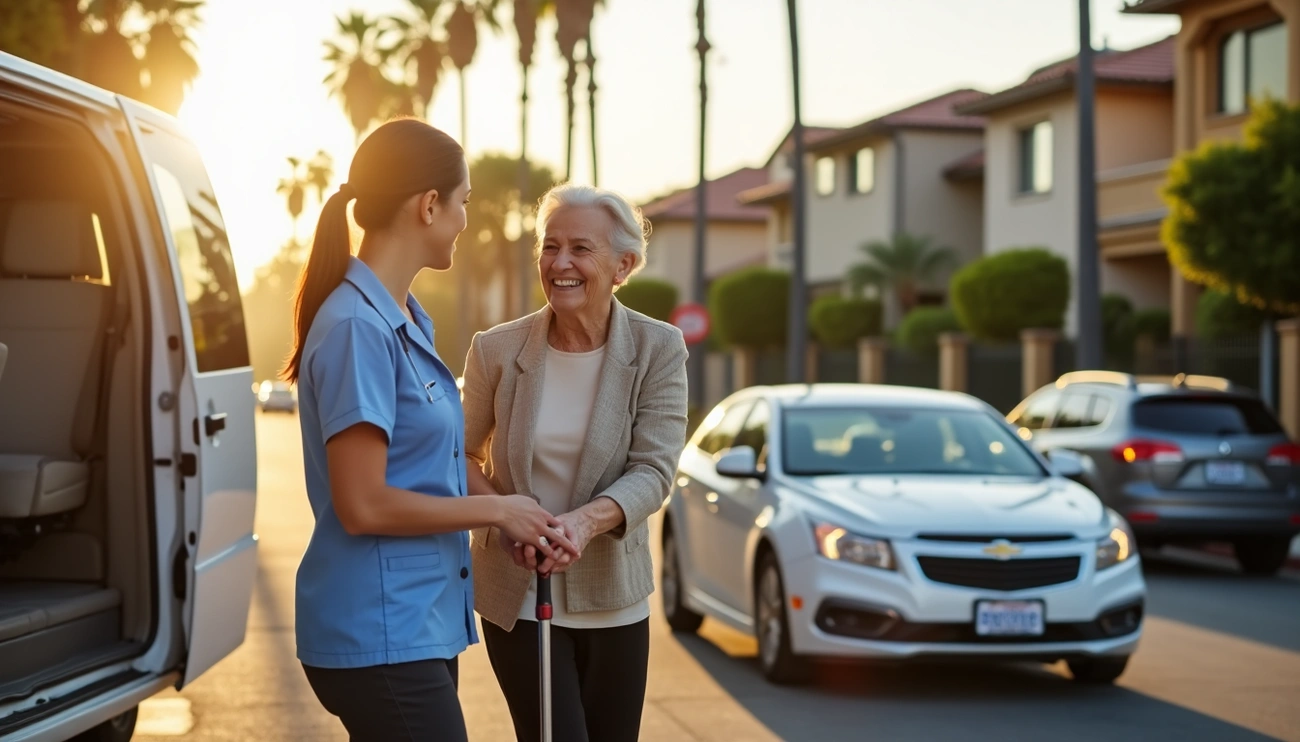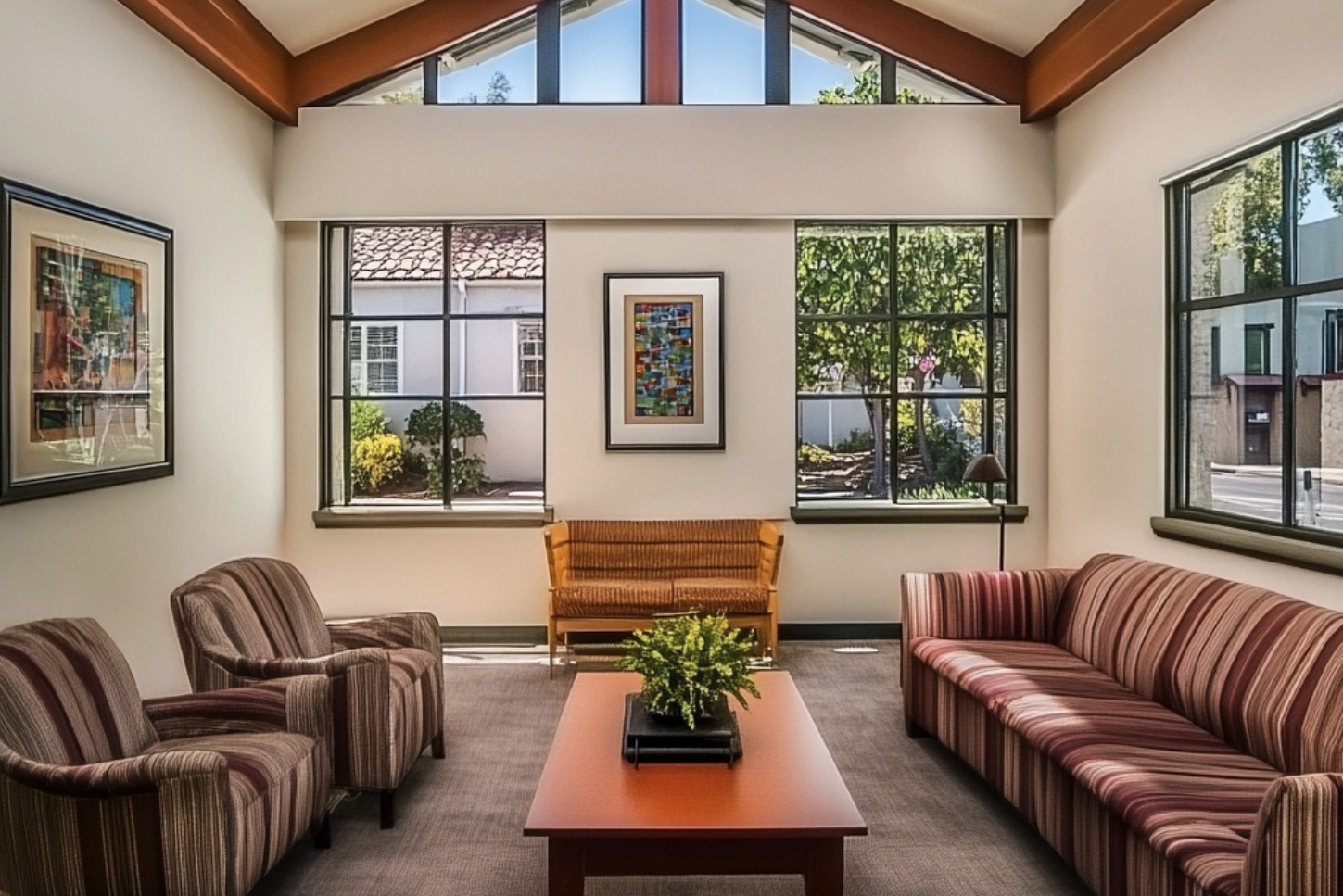Half of Americans ages 65 and older do not have access to public transportation, according to recent data. This alarming statistic highlights a critical challenge facing seniors throughout the country, particularly in sprawling urban centers like Los Angeles.
The Beverly Foundation reports that transportation ranks as the second most important issue for seniors, surpassed only by health concerns. In Los Angeles, where car dependency is high, limited mobility directly impacts senior independence and quality of life.
Various transportation options exist throughout the city for elderly and disabled residents. These range from private door-to-door services to free community programs designed to accommodate different needs and financial situations. Specialized senior transportation services help older adults maintain social connections and access essential medical appointments without relying on personal vehicles.
This guide examines the most effective transportation solutions for seniors in Los Angeles County, providing information about services that enable older residents to remain mobile, independent, and connected to their communities.
Senior Transportation Needs in Los Angeles
Los Angeles County presents unique mobility challenges for aging residents. The region’s car-dependent infrastructure creates significant barriers for seniors who can no longer drive safely. Transportation limitations directly impact older adults’ ability to maintain independence and quality of life throughout the sprawling metropolitan area.
Why driving becomes difficult with age
Driving abilities typically decline as people age. California changes driver’s license renewal policies after age 70, coinciding with an increase in driving fatalities among this demographic. Data shows drivers 70 and older experience higher crash death rates per 1,000 collisions than middle-aged drivers between 35-54. These statistics reflect natural age-related physical and cognitive changes.
Vision deterioration makes reading road signs and judging distances increasingly difficult. Hearing loss prevents many seniors from detecting emergency vehicles or warning sounds. Physical limitations, including reduced strength, coordination and flexibility, compromise vehicle control abilities.
Most seniors experience gradual decline in driving capability. Common warning signs include:
- Getting lost in familiar neighborhoods
- Accumulating vehicle dents and scrapes
- Experiencing frequent close calls or minor collisions
Cognitive processing speed diminishes with age, creating difficulties in complex driving scenarios like freeway merging or navigating busy intersections. Research indicates failure to yield right-of-way represents the most common error in senior-involved crashes.
The impact of limited mobility on independence
When Los Angeles seniors lose driving privileges, the consequences extend beyond inconvenience. Transportation access directly affects healthcare utilization, social engagement, and essential services. One quarter of patients miss medical appointments due to transportation barriers, resulting in poorer health outcomes.
Mobility limitations trigger cascading negative effects. Seniors unable to drive make fewer trips outside their homes, increasing isolation. This isolation produces measurable health impacts – socially isolated seniors face higher risks of premature death, nursing facility placement, and incur an additional $1,600 annually in Medicare costs.
Walking becomes the primary transportation mode for many LA seniors, yet environmental hazards create substantial barriers. UCLA researchers discovered older adults in Koreatown, Westlake, and East Hollywood face uncomfortable walking conditions with trip and fall hazards. These environments significantly reduce independence and quality of life.
Mobility restrictions directly limit community participation. A study of community-dwelling Medicare beneficiaries found 47% of people 65 and older reported at least some walking difficulty. Individuals with walking difficulties and non-drivers show lower rates of preventive health check-ups, civic engagement, and social connection maintenance.
Transportation solutions become increasingly urgent as LA’s senior population grows. While various options exist—from paratransit to ride-sharing services—many seniors encounter access barriers. Some lack technological skills for ride-hailing apps, while others find public transit physically challenging or time-consuming.
Top 6 Senior Transportation Services in Los Angeles
Los Angeles County offers multiple specialized transportation options for seniors who no longer drive, ranging from technology-enabled solutions to community volunteer programs. These services help older adults maintain independence while staying connected to essential services and social activities.
1. GoGoGrandparent
GoGoGrandparent connects seniors with rideshare services without requiring smartphone technology. Users call a toll-free number (855-464-6872) to schedule rides to medical appointments, grocery stores, or social events. The service monitors all trips for safety and arranges rides with screened Lyft or Uber drivers.
The service accommodates walkers and foldable wheelchairs, provided users can transfer into vehicles independently. Current pricing averages $14 for a 4-mile trip, approximately 20% less than traditional taxi services. Customer service representatives remain available 24/7 to arrange transportation, provide cost estimates, and address questions.
2. ITN America
Independent Transportation Network (ITN) America delivers door-through-door transportation assistance through community-based programs nationwide. Unlike standard rideshare options, ITN drivers provide comprehensive assistance beyond curbside pickup.
This membership organization employs both paid and volunteer drivers and operates continuously throughout the week. While members pay a $40 fee, ITN offers unique programs including CarTrade, which converts personal vehicles into ride credits, and Personal Transportation Accounts that allow family members to contribute remotely.
3. Access Services (Paratransit)
Access Services provides paratransit transportation for Los Angeles County residents with disabilities who cannot use regular public transit. This shared-ride service operates from 4am to midnight daily within 3/4 mile of fixed bus or rail routes.
Qualifying for service requires an in-person functional assessment rather than simply meeting age requirements. Fares vary by distance: $2.75 for trips under 20 miles and $3.50 for longer journeys within the Los Angeles Basin. Prospective users can call 800-827-0829 for application information.
4. Veyo (Non-Emergency Medical Transport)
Veyo focuses exclusively on non-emergency medical transportation through partnerships with insurance providers and healthcare facilities. Their drivers complete specialized training in CPR, HIPAA regulations, and medical sensitivity.
The service often comes at no cost when covered by health insurance, representing its primary advantage. However, seniors cannot access Veyo directly—transportation must be arranged through insurance providers or medical facilities. Veyo vehicles accommodate wheelchairs and stretchers, serving those with significant mobility limitations.
5. Local Volunteer Driver Programs
Several volunteer transportation programs serve Los Angeles seniors. The New Freedom Volunteer Driver Mileage Reimbursement Program enables seniors to recruit personal volunteer drivers who receive compensation for mileage.
Organizations like AgingNext provide door-through-door service with volunteer drivers throughout specific areas of LA County, including Claremont, Pomona, and West Covina. These programs typically transport seniors to medical appointments, grocery stores, and social activities with minimal or no fees.
6. Public Transit Senior Discounts
Public transportation becomes significantly more economical for seniors through various discount programs. Metro offers reduced fares for riders 62 and older, with daily spending capped at $2.50 and weekly expenses limited to $5. All rides beyond these caps are free.
Metrolink provides seniors (65+) discounts of 25% on monthly passes and up to 50% off one-way and round-trip tickets. Accessing these discounts requires a Reduced Fare TAP card, obtainable through online applications or in-person visits to Metro Customer Centers.
How to Choose the Right Service for Your Needs
Selecting transportation services for seniors in Los Angeles requires understanding key differences between available options. The right choice depends on specific mobility needs, medical requirements, and personal preferences.

Medical vs. non-medical transportation
Transportation services typically fall into two categories based on the level of medical support provided. Non-Emergency Medical Transportation (NEMT) offers specialized service with drivers trained to assist seniors needing medical support during transit. These drivers understand proper techniques for transporting patients with limited mobility or medical conditions.
Many health insurance plans cover transportation costs for medical appointments. Patients with full Medi-Cal coverage through L.A. Care, Health Net, or Molina qualify for free rides to medical appointments through partnered services. Some health plans extend coverage to include meals, hotel stays, and parking expenses for necessary medical travel.
Non-medical transportation addresses general mobility needs such as grocery shopping, social visits, and errands. The LADOT Cityride Program provides Los Angeles residents aged 65+ with discounted transportation for both medical and non-medical purposes.
Door-to-door vs. curbside pickup
Service levels vary significantly between transportation providers. Door-to-door service includes comprehensive assistance where drivers enter homes to help seniors to vehicles, assist with mobility devices, accompany them throughout journeys, and ensure safe arrival at destinations.
This option serves bed-ridden patients, wheelchair or stretcher-dependent individuals, and those unable to walk independently. ITN America distinguishes itself by offering “arm-through-arm, door-through-door service,” exceeding typical transportation support.
Curb-to-curb service requires seniors to navigate from their homes to the curb independently. Taxi services, public transit, and some paratransit programs offer this option, suitable for seniors with minimal mobility challenges who can manage short distances without assistance. Access Services provides this type of service throughout Los Angeles County.
Wheelchair accessibility and special needs
LADOT fixed-route buses feature wheelchair tie-down positions and accommodate walkers, crutches, and other mobility devices. Various specialized options exist for different needs:
Service animals accompany riders on all LADOT services with proper documentation. Passengers with limited mobility, visual impairments, or hearing difficulties can request that drivers vocally identify stops.
Wheelchair users benefit from dedicated services like the MODE program, which offers curb-to-curb, shared rides in lift-equipped vehicles at discounted rates. Beverly Hills Dial-A-Ride similarly provides curb-to-curb service for eligible residents, prioritizing medical appointments.
The best transportation choice depends on mobility requirements, budget constraints, and scheduling flexibility. For personalized recommendations tailored to specific communities and circumstances, seniors can call 211 to connect with local transportation resources.
Free and Low-Cost Options for Seniors
Los Angeles County offers numerous free and subsidized transportation programs designed to keep seniors mobile without financial strain. These services range from completely free rides to low-cost options that accommodate various needs and circumstances.
Free transportation for seniors near me
The New Freedom Taxicab Services Program provides eligible LA County seniors with up to four one-way trips totaling 40 miles monthly at no cost. Access Services delivers paratransit options for residents with disabilities who cannot use regular public transit.
Los Angeles Department of Aging makes Door-to-Door transportation available through its Multi-Purpose Senior Centers. Beverly Hills residents 62 and older can access the Dial-A-Ride Shuttle, offering free curb-to-curb service to any location within city limits. DASH bus rides are free for Cityride participants who present their Cityride Card and government identification.
Programs offered by local nonprofits and churches
Community Assisted Rides (CARS) provides accompanied transportation for adults 60+ through their Ride Program. Their service never turns away passengers unable to donate, offering door-through-door assistance at no charge.
St. Mary Community Action Agency offers specialized senior transportation for medical appointments and errands throughout their service area. Clients must call at least two days before appointments to arrange service. St. Barnabas Senior Services transports seniors to medical appointments and other destinations for just 50 cents each way, with wheelchair-accessible vans available.
Using 211 and Eldercare Locator to find help
The Eldercare Locator connects seniors to transportation services nationwide through its hotline at 1-800-677-1116 or website. Their specialists identify transportation resources customized to individual needs and locations.
211 LA serves as a comprehensive resource for seniors seeking transportation assistance, maintaining an extensive database of ride programs throughout Los Angeles County. When calling, seniors should have their zip code ready, as many services operate only in specific areas. Some programs exclusively serve South Central Los Angeles residents in zip codes 90001, 90002, 90003, and others.
These resources help seniors maintain independence without incurring significant transportation costs.
Tips for Caregivers and Family Members
Managing transportation for aging loved ones creates significant challenges for caregivers who already handle multiple responsibilities. Los Angeles County offers several resources to simplify this process and reduce caregiver burden.
How to coordinate rides for elderly loved ones
The New Freedom Volunteer Driver Mileage Reimbursement Program allows families to develop sustainable transportation solutions with familiar faces. Eligible participants can recruit trusted friends, family members, or neighbors as volunteer drivers and receive reimbursement for up to 150 miles monthly. This approach provides consistency and comfort since seniors travel with someone they already know.
Health insurance often covers transportation costs for medical appointments. Many plans fully cover these expenses, eliminating financial concerns for necessary healthcare visits.
When multiple family members share caregiving duties, a shared calendar helps distribute driving responsibilities evenly, preventing burnout while ensuring all appointments receive coverage.
Monitoring safety and reliability of services
Professional transportation services require careful evaluation. Caregivers should arrange initial test rides to observe driver interactions and mobility equipment handling. Requesting driver identification information before each scheduled pickup provides additional security.
LA County’s Project Lifesaver program offers trackable bracelets for seniors with cognitive impairments who might wander. These devices emit radio frequency signals every few seconds. When a loved one goes missing, families should call 911 immediately and inform operators about the bracelet—specialized Sheriff’s Department teams can assist with search and rescue operations.
Using alerts and tracking tools for peace of mind
Access Services’ “Where’s My Ride” tool allows users to check vehicle location 15 minutes before scheduled pickup time. This system works across multiple platforms including smartphones, computers, tablets, and basic flip phones through SMS messaging.
The LA Found initiative provides free tracking devices countywide for individuals with Alzheimer’s, dementia, and autism. The program has already helped locate at least four missing people since its inception.
Well-coordinated transportation solutions significantly improve seniors’ quality of life while simultaneously reducing stress for their caregivers.
Conclusion
Transportation challenges need not limit seniors’ independence in Los Angeles County. The region offers numerous mobility options for older adults who no longer drive, with services tailored to various needs, abilities, and budgets.
The availability of services like GoGoGrandparent, ITN America, and Access Services demonstrates that transportation solutions exist for nearly all situations. These options accommodate seniors with different physical capabilities, from those needing minimal assistance to individuals requiring comprehensive door-through-door support.
Free and subsidized programs throughout LA County provide particularly valuable resources. The Department of Aging, religious organizations, and community groups offer transportation services that ensure financial limitations don’t restrict mobility. Resources such as 211 and the Eldercare Locator connect seniors to transportation assistance tailored to specific neighborhoods.
For caregivers and family members, volunteer driver programs, insurance-covered medical transport, and tracking technologies reduce the logistical challenges of coordinating transportation. These tools provide practical solutions while offering security and reliability.
Mobility remains essential for senior independence and quality of life in Los Angeles. While identifying appropriate transportation services requires some investigation, the benefits significantly outweigh the effort. Access to reliable transportation enables older adults to maintain healthcare appointments, social connections, and community engagement throughout Los Angeles County.

FAQs
Q1. What transportation services are available for seniors in Los Angeles? Los Angeles offers various transportation options for seniors, including GoGoGrandparent, ITN America, Access Services (Paratransit), Veyo for non-emergency medical transport, local volunteer driver programs, and public transit with senior discounts.
Q2. Are there any free transportation services for seniors in Los Angeles? Yes, there are free and low-cost options available. The New Freedom Taxicab Services Program offers free rides to eligible seniors, and some health insurance plans cover transportation to medical appointments. Additionally, local nonprofits and churches often provide free or heavily discounted transportation services.
Q3. How can I find the right transportation service for my needs? Consider factors such as whether you need medical or non-medical transportation, door-to-door or curbside pickup, and wheelchair accessibility. You can also use resources like 211 or the Eldercare Locator to find services tailored to your specific needs and location.
Q4. What should caregivers know about coordinating transportation for seniors? Caregivers can use volunteer driver programs, create shared calendars with family members, and utilize tracking tools for peace of mind. It’s also important to monitor the safety and reliability of services and check if health insurance covers transportation costs for medical appointments.
Q5. Does Medicare cover transportation for seniors? Medicare may cover transportation in certain circumstances. Part A might cover emergency transportation, while Part B may cover transportation if it’s deemed medically necessary. Some Medicare Advantage plans offer additional transportation benefits, so it’s best to check with your specific plan for details.












